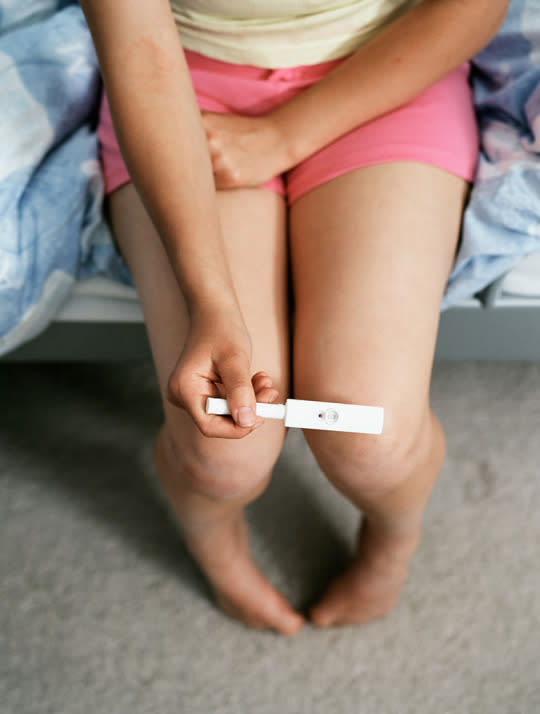How You Could Be Pregnant With No Symptoms

We’ve all read the headlines about women who unexpectedly give birth and then claim they never even knew they were pregnant. Those of us who had morning sickness, fatigue or weight gain during our pregnancies often shake our heads in disbelief. Surely you can’t be pregnant with no symptoms? Or have symptoms but not notice them?
Yet doctors say there are many reasons a woman might not notice she is pregnant.
More From SheKnows: Placenta bracelets & more wild things moms can make with their afterbirth
“We, as human beings, have a powerful denial factor,” says Dr. Dan Frayne, assistant residency director of the Mountain Area Health Education Center’s Family Medicine Residency Program in Asheville, North Carolina, and co-chair of the National Preconception Health and Health Care Initiative. “You can be in denial and neglect to see the changes to your body for a fairly long time. Some women who are overweight might not see a huge change in their body, and if you are skinny, you might not show until 20 weeks.”
Denial of pregnancy is more common than expected, according to a study in the Journal of the Royal Society of Medicine. Researchers found that 1 in 475 women may not realize they’re pregnant until 20 weeks’ gestation, and 1 in 2,500 women make it right up to delivery before finding out (a rate similar to that of eclampsia).
More From SheKnows: Women confess the craziest reasons they’ve faked a pregnancy
Dr. Frayne outlined four reasons a woman might neglect to notice pregnancy symptoms:
Young teens who are unaware
It’s not uncommon for a young teenager to be unaware of her body and changes that occur during pregnancy, Dr. Frayne says. Some teens have irregular periods, so missing a period for six months might not be unusual. Young teens will often seek medical care for abdominal or back pain at 30 or 32 weeks, Dr. Frayne says, and when they are told they are pregnant, it is not uncommon to find out they suspected they were pregnant but were afraid to tell anyone.
Women who are busy
Some women have competing demands in their lives — children, family, work — that make it difficult for them to notice the changes in their body, or they are in denial about the changes they are seeing, Dr. Frayne says. Sometimes it takes a period of time for them to either recognize the changes or to decide they want to see a doctor.
Women with an addiction
It’s not uncommon for women with an addiction or women who abuse substances to not notice they are pregnant, because it is not a primary concern for them, Dr. Frayne says.
Women who believe they don’t need prenatal care
It’s not uncommon for a woman who has either been pregnant before or who believes she knows what to do about her pregnancy to not seek prenatal care, Dr. Frayne says.
More From SheKnows: Why I regret choosing the hottie OB-GYN to deliver my babies
One of the underlying causes for this denial, says Dr. Frayne, is that more than half of U.S. pregnancies are unplanned or unwanted. When many women finally do seek medical advice and are told they are pregnant, the majority aren’t surprised. “In many cases they are being told something they knew and suspected but didn’t want to admit.”
Unfortunately this lack of awareness can put the mother and child at risk for complications during birth. The concern, says Dr. Frayne, is that prenatal care provides the best opportunity for a healthy pregnancy. It’s important for a pregnant woman to visit her doctor within the first 12 weeks of her pregnancy, he says. Even when women know they are pregnant, they often don’t visit their doctor early enough, he adds, because they lack health insurance and access to care.
Despite the fact that the U.S. spends more money on health care than any other country, we have one of the worst infant mortality rates compared with similar economically developed countries. The United States also has a rising maternal death rate. “The U.S. is the only developed country where more mothers are dying now than 10 to 20 years ago,” he says.
More From SheKnows: Woman gives baby unforgettable name after giving birth in Uber car
“Women of reproductive age aren’t as healthy as they used to be,” Dr. Frayne says, noting that 43 percent of U.S. women of reproductive age have a medical condition, more than half are obese and 1 in 5 don’t have health insurance.
One question all health care providers should ask their female patients is whether they want to become pregnant in the next year, Dr. Frayne says. This will encourage patients and doctors to discuss preconception and prenatal care. —Lisa Rabasca Roepe
(Photo: Getty Images)
